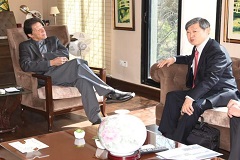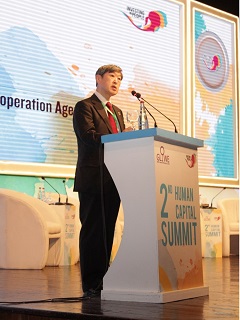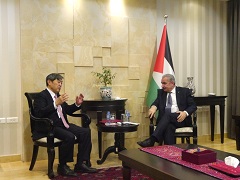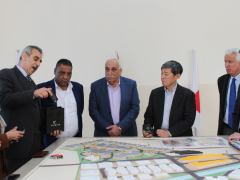- Home
- News & Features
- News
- FY2019
- JICA President Kitaoka visited Pakistan and Palestine: Reaffirming efforts toward social peace and stability, and further strengthening relations with them
News
March 4, 2020
JICA President Kitaoka visited Pakistan and Palestine: Reaffirming efforts toward social peace and stability, and further strengthening relations with them
JICA President KITAOKA Shinichi visited the Islamic Republic of Pakistan and the Palestinian Territories from Feb. 17 to 27. He delivered a keynote speech at the Second Human Capital Summit in Pakistan. He also held meetings with government officials and visited project sites in each country/region.
1. The Islamic Republic of Pakistan
 Meeting with Prime Minister Imran Khan
Meeting with Prime Minister Imran Khan The Second Human Capital Summit
The Second Human Capital Summit
President Kitaoka met with Prime Minister, H.E. Imran Khan in the country’s capital of Islamabad. President Kitaoka stated that Pakistan is the world’s sixth-largest country in terms of population and that its sound development is essential for the peace and stability of the region and the world. He also emphasized the importance of deepening the cooperation between Japan and Pakistan, which has existed since ancient times, and promoting cooperation based on the priority policies of Prime Minister Khan, such as poverty reduction and human capital development.
Prime Minister Khan expressed gratitude to JICA for its contribution to the development of Pakistan, including the income generation of disadvantaged households and the development of community infrastructure. He then expressed his expectations for further cooperation and confirmed that the two countries would further deepen their mutual relationship. Also, he showed keen interest in Japan’s post-World War II experience of development.
In the southern province of Sindh, President Kitaoka held dialogues with Imran Ismail, Governor of Sindh, and Syed Murad Ali Shah, Chief Minister of the Government of Sindh. Both expressed their gratitude to JICA for its long-term cooperation with the province and confirmed the importance of deepening cooperation in areas such as education, water and sanitation, and urban transportation, as well as human resource exchanges between the two countries in the future.
President Kitaoka attended the Second Human Capital Summit in Islamabad co-hosted by the World Bank and JICA, where he gave a keynote speech. President Kitaoka introduced Japan’s modernization experience and JICA’s efforts to contribute to the formation of human capital (Note 1), and emphasized that women’s education and participation in society will lead to the healthy growth of the next generation. Furthermore, he emphasized that the investment in human capital is essential to realize human security, a concept that aims to build a world where everyone can live in dignity, free from fear and want. He also stated that JICA would continue to work with the Government of Pakistan to create resilient society for achieving quality growth.
He also visited one of the project sites of non-formal education for out-of-school children, and the Polio Laboratory of the National Institute of Health, which is doing research and development activities to eradicate polio and other infectious diseases.
In addition, President Kitaoka exchanged views with government officials and representatives of Japanese companies active in Pakistan and reaffirmed the importance of Pakistan and high expectations for the country.
2. Palestine
 Meeting with Prime Minister Mohammad Shtayyeh
Meeting with Prime Minister Mohammad Shtayyeh Receiving an update on the status of JAIP development
Receiving an update on the status of JAIP development
President Kitaoka held a meeting with Prime Minister, H.E. Mohammad Shtayyeh in Ramallah. Prime Minister Shtayyeh expressed his gratitude for JICA’s long-term cooperation and stated that he would like to strengthen relations with Japan even under the unfavorable international situation. They exchanged views on the promotion of cooperation through the “Corridor for Peace and Prosperity” initiative (Note 2) and the “Conference on Cooperation among East Asian Countries for Palestinian Development: CEAPAD” (Note 3), as well as on priority development issues such as education and water and sewer services. After the meeting, President Kitaoka attended the signing ceremony of the Record of Discussions of the “Refugee Camp Improvement Project phase 2”, a technical cooperation project, and the Grant Agreement of “Project for the Improvement of Medical Equipment”, a grant-aid project.
President Kitaoka visited tenant companies operating in the Jericho Agro-Industrial Park (JAIP), the main project of the “Corridor for Peace and Prosperity” initiative, and exchanged views on industrial development for Palestine’s economic independence with government officials and business persons. He said he hopes that JAIP will become a model for the development of Palestinian industrial parks while solving various issues. He also visited the Aqbat Jabar Refugee Camp and Jericho Sewage Treatment Plant on the outskirts of Jericho, where the living conditions of residents are improving with Japan’s cooperation. He then exchanged views with relevant parties on future cooperation, including Japan’s experience of modernization and post-war reconciliation.
JICA will continue to provide various cooperation to contribute to the development of the economic and social foundations all over Palestinian Territories, including the realization of the “Corridor for Peace and Prosperity” initiative.
(Note 1) Human Capital. The knowledge, skills, and health a person accumulates that are required for an individual to demonstrate his or her potential. The World Bank established the “Human Capital Project” in 2018 based on the thinking that emphasizes human capital centering on education, health, and nutrition is essential for the development of individuals and societies in the future. President Kitaoka was designated by the World Bank as one of the “Human Capital Champions” who vigorously advocate the importance of human capital.
(Note 2)
A medium-to-long-term initiative to promote social and economic development in the Jordan Valley through regional cooperation among Japan, Palestine, Israel, and Jordan, and to promote economic independence and confidence-building among the parties concerned.
(Note 3)
A Regional Cooperation Framework established by Japan in February 2013 to support the nation-building of Palestine by mobilizing the resources and economic development knowledge of East Asian countries toward the realization of peace through a "two-state solution."
- About JICA
- News & Features
- Countries & Regions
- Our Work
- Thematic Issues
- Types of Assistance
- Partnerships with Other Development Partners
- Climate Change / Environmental and Social Considerations
- Evaluations
- Compliance and Anti-corruption
- Science and Technology Cooperation on Global Issues
- Research
- JICA Development Studies Program / JICA Chair
- Support for the Acceptance of Foreign HRs / Multicultural and Inclusive Community
- Publications
- Investor Relations





